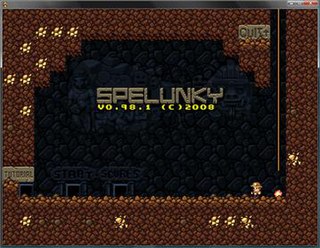Related Research Articles
The Xbox network, formerly known and commonly referred to as Xbox Live, is an online multiplayer gaming and digital media delivery service created and operated by Microsoft Gaming for the Xbox brand. It was first made available to the original Xbox console on November 15, 2002. An updated version of the service, adding the Xbox Live Marketplace, became available with the Xbox 360 console launch in November 2005, and a further enhanced version was released in 2013 with the Xbox One. The service is used on the latest Xbox Series X and Series S and, in addition to a Microsoft account, is the account for Xbox ecosystem; accounts can store games and other content.
Homebrew, when applied to video games, refers to software produced by hobbyists for proprietary video game consoles which are not intended to be user-programmable. The official documentation is often only available to licensed developers, and these systems may use storage formats that make distribution difficult, such as ROM cartridges or encrypted CD-ROMs. Many consoles have hardware restrictions to prevent unauthorized development.

Phantom Dust is a 2004 real-time strategy action video game developed by Microsoft Game Studios Japan and published by Microsoft Game Studios for the Xbox console. The game was released in Japan on September 23, 2004 and in North America on March 15, 2005, licensed for release in North America by Majesco Sales.

Peiter C. Zatko, better known as Mudge, is an American network security expert, open source programmer, writer, and hacker. He is currently the chief information officer of DARPA. He was the most prominent member of the high-profile hacker think tank the L0pht as well as the computer and culture hacking cooperative the Cult of the Dead Cow.

State of Emergency is a beat 'em up/shoot 'em up video game developed by VIS Entertainment and published by Rockstar Games for PlayStation 2 and Xbox, and by Global Star Software for Microsoft Windows.
A security hacker or security researcher is someone who explores methods for breaching defenses and exploiting weaknesses in a computer system or network. Hackers may be motivated by a multitude of reasons, such as profit, protest, information gathering, challenge, recreation, or evaluation of a system weaknesses to assist in formulating defenses against potential hackers.
Microsoft Points, introduced in November 2005 as Xbox Live Points, were a digital currency issued by Microsoft for use on its Xbox and Zune product lines. Points could be used to purchase video games and downloadable content from Xbox Live Marketplace, digital content such as music and videos on Zune Marketplace, along with content from Windows Live Gallery.
The Xbox 360 is a home video game console developed by Microsoft. As the successor to the original Xbox, it is the second console in the Xbox series. It was officially unveiled on MTV on May 12, 2005, with detailed launch and game information announced later that month at the 2005 Electronic Entertainment Expo (E3). As a seventh-generation console, it primarily competed with Sony's PlayStation 3 and Nintendo's Wii.
Kawaiicon is a New Zealand computer security conference held in Wellington from 2007. It brings together a variety of people interested in information security. Representatives of government agencies and corporations attend, along with hackers.

The Xbox is a home video game console manufactured by Microsoft that is the first installment in the Xbox series of video game consoles. It was released as Microsoft's first foray into the gaming console market on November 15, 2001, in North America, followed by Australia, Europe and Japan in 2002. It is classified as a sixth-generation console, competing with Sony's PlayStation 2, Sega's Dreamcast and Nintendo's GameCube. It was also the first major console produced by an American company since the release of the Atari Jaguar in 1993.

Spelunky is a 2008 source-available 2D platform game created by independent developer Derek Yu and released as freeware for Microsoft Windows. It was remade for the Xbox 360 in 2012, with ports of the new version following for various platforms, including back to Microsoft Windows. The player controls a spelunker who explores a series of caves while collecting treasure, saving damsels, fighting enemies, and dodging traps. The caves are procedurally generated, making each run-through of the game unique.

Kinect is a discontinued line of motion sensing input devices produced by Microsoft and first released in 2010. The devices generally contain RGB cameras, and infrared projectors and detectors that map depth through either structured light or time of flight calculations, which can in turn be used to perform real-time gesture recognition and body skeletal detection, among other capabilities. They also contain microphones that can be used for speech recognition and voice control.
RockYou was a company that developed widgets for MySpace and implemented applications for various social networks and Facebook. Since 2014, it has engaged primarily in the purchases of rights to classic video games; it incorporates in-game ads and re-distributes the games.

A Microsoft account or MSA is a single sign-on personal user account for Microsoft customers to log in to consumer Microsoft services, devices running on one of Microsoft's current operating systems, and Microsoft application software.

Watch Dogs is a 2014 action-adventure game developed by Ubisoft Montreal and published by Ubisoft. It is the first installment in the Watch Dogs series. The game is played from a third-person perspective, and its world is navigated on foot or by vehicle. Set within a fictionalized version of the Chicago metropolitan area in 2013, the single-player story follows grey hat hacker and vigilante Aiden Pearce's quest for revenge after the killing of his niece. An online multiplayer mode allows up to eight players to engage in cooperative and competitive gameplay.

The Xbox One is a home video game console developed by Microsoft. Announced in May 2013, it is the successor to Xbox 360 and the third console in the Xbox series. It was first released in North America, parts of Europe, Australia, and South America in November 2013 and in Japan, China, and other European countries in September 2014. It is the first Xbox game console to be released in China, specifically in the Shanghai Free-Trade Zone. Microsoft marketed the device as an "all-in-one entertainment system", hence the name "Xbox One". An eighth-generation console, it mainly competed against Sony's PlayStation 4 and Nintendo's Wii U and later the Nintendo Switch.
The Xbox system software is the operating system developed exclusively for Microsoft's Xbox home video game consoles. Across the four generations of Xbox consoles, the software has been based on a version of Microsoft Windows and incorporating DirectX features optimized for the consoles. The user interface, the Xbox Dashboard, provides access to games, media players, and applications, and integrates with the Xbox network for online functionality.
A bug bounty program is a deal offered by many websites, organizations, and software developers by which individuals can receive recognition and compensation for reporting bugs, especially those pertaining to security exploits and vulnerabilities.
Tavis Ormandy is an English computer security white hat hacker. He is currently employed by Google and was formerly part of Google's Project Zero team.

Benjamin Kunz Mejri is a German IT security specialist and penetration tester. His areas of research include vulnerabilities in computer systems, bug bounties, the security of e-payment payment services and privacy protection. Mejri is known for uncovering new zero-day vulnerabilities and making them transparent to the public.
References
- ↑ Thomas, Karl (11 August 2015). "5 child geniuses destined for a career in cybersecurity". WeLiveSecurity. ESET. Retrieved 28 October 2016.
- 1 2 3 Castillo, Michel del (4 April 2014). "5-year-old hacker lends Microsoft a hand". Upstart Biz Journals. Retrieved 23 April 2014.
- ↑ Molina, Brett (5 April 2014). "5-year-old discovers Xbox security flaw, Microsoft rewards him". The Sydney Morning Herald. Retrieved 23 April 2014.
- ↑ Callaham, John (4 April 2014). "5-year-old boy finds Xbox One security flaw, Microsoft rewards him with free games" . Retrieved 8 April 2014.
- ↑ Ecarma, Jordan (4 April 2014). "5-YEAR-OLD HACKS XBOX LIVE TO ACCESS LOCKED GAME". Auto World News. Retrieved 23 April 2014.
- ↑ Mosely, Jared (4 April 2014). "Kindergarten hacker: 5 year old breaks into dad's Xbox Live account". Venture Beat. Retrieved 8 April 2014.
- ↑ Syeda, S (7 April 2014). "Microsoft Xbox Security Flaw Exposed by Five Year Old". The News Reports. Archived from the original on 8 April 2014. Retrieved 23 April 2014.
- ↑ Merva, Nick (7 April 2014). "5-year-old Ocean boy exposes Microsoft Xbox Vulnerability" . Retrieved 23 April 2014.
- ↑ Gross, Doug (4 April 2014). "5-year-old boy hacks dad's Xbox account". CNN. Retrieved 8 April 2014.